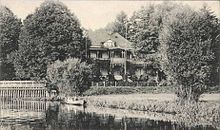August Jauch
Johannes Carl August Jauch (born March 2, 1848 in Pöhls near Oldesloe; † November 21, 1930 in Hamburg ) was a Holstein squire and Hamburg politician .
Origin and family
Jauch comes from the Hanseatic family Jauch . He was born as the second child of Hermann Jauch (1817-1859) and his wife Sophia. Wüstney born. Jauch was married to his cousin Anna Lührsen (1854–1890) in his first marriage and to the merchant's daughter Catharina Margaretha Matthiessen († 1930) in his second marriage. Jauch had two children from each marriage, including the plantation and factory owner in Guatemala Otto Jauch (1874-1949) and the first public prosecutor in Hamburg Heinrich Jauch (1894-1945).
His brother-in-law was the noble staff - he did not carry the title according to the Hamburg practice - Imperial German Ambassador Extraordinary and Minister Johannes Lührsen (1838–1903). His nephews were Hans von Feldmann , Lieutenant General and State Secretary, and Otto von Feldmann , Lieutenant Colonel i. G., during World War I chief of the operations department of the Ottoman Grand Headquarters.
Act
Jauch acquired the Fernsicht and Marienhof estates on the Stör near Kellinghusen from the Hamburg Huguenot Camille Vidal . Until then, Fernsicht had been the headquarters of Vidal's company, which manufactured pottery in Kellinghusen.
Jauch initially managed the estate himself, before moving to Hamburg later and devoting himself to public tasks. Jauch had been friends with the Mannhardt family since he was raised at the Mannhardt Boys' Institute at Hanerau Castle, which his cousin and later brother-in-law Johannes Lührsen also visited. In 1881 he left the "Villa Fernsicht" to Julius Mannhardt as a residential building, from where Mannhardt looked after his practice in Neumünster. Theodor Storm, who was friends with Mannhardts, and Detlev von Liliencron , who was the parish governor of Kellinghusen at the time , met there in 1884 .
Jauch fought as a sergeant in the 1870-71 war in the 2nd Brandenburg Lancers no. 11 and in the First World War and still led in 1916 as captain 56-year a squadron of Landwehr in Galicia . In 1870/71 he was awarded the Iron Cross 2nd Class. Not dependent on acquisition, he moved from his estate to Hamburg in 1890 in order to devote himself to the public good ever since.
Jauch was from 1893–1895 and 1898–1915 a notable member of the Hamburg citizenship . Even a member of an old merchant family, he joined the faction of the right, which represented the interests of the upper classes. The faction of the Left was composed mainly of craftsmen , the faction of the Left Center predominantly industrialists . 1902-1904 Jauch belonged to the citizens' committee .
Jauch stood up - following the example of his aunt, the philanthropist Auguste Jauch (1822-1902), and like his nephew Robert Jauch (1856-1909) - in a special way for the needs of the poor and orphans in Hamburg. In addition to his work as a member of the Notable Parliament, he was together for almost twenty years a member of the authorities for housing maintenance and forced upbringing, member of the supervisory authority for the charitable foundations, member of the orphanage college, for this district head for Hohenfelde and Borgfelde , member of the poor college, for this head of the district I for poor relief and member of the section for the work and poor house, member of the guardianship authority, guardianship judge, chairman and honorary chairman of the institution for the deaf and dumb, chairman of the Jauch Foundation "Home for Old Men", the Nordheim Foundation in Sahlenburg , the Wilhelm-Jantzen- Foundation and other foundations.
In his church, Jauch was a parish elder of the Hamburg-Borgfelde parish , member of the church council, 1st chairman of the administrative committee of the parish (Beede), member of the synod and the convent, significantly involved in the construction of the old Church of the Redeemer in 1902/03.
literature
- German Gender Book Volume 200, 13. Hamburger, S. 398f, ISBN 3-7980-0200-2
- Wiegand, Frank-Michael: The notables . Volume 30 of the contributions to the history of Hamburg , Hamburg 1987
- Iris Groschek: Parish chronicle of the Erlöserkirche Borgfelde , Hamburg 2000, Volume 8 of the publications of the archive of the church district Alt-Hamburg , ISSN 1432-2579
Sources and explanations
- ↑ Schleswig-Holstein Ministry of Justice, Schleswig-Holstein ads , 1870, p. 456
- ↑ Maria Keipert, Peter Grupp, Biographical Handbook of the German Foreign Service: LR , 2008, p. 138
- ^ Theodor Storm, Erich Schmidt, Briefwechsel: 1880–1888 , 1972, p. 208 fn. 10
- ^ Karl von Schöning, Mass: History of the Uhlan Regiment Graf Haeseler (2nd Brandenburg) No. 11th v. Schöning's history of the 2nd Brandenburg Uhlan Regiment No. 11 from its foundation until January 1, 1885: on the orders of Konigl. Rework regiment and continued until 1906 by Mass, issue 11 , 1906, p. 152
- ↑ Michael Werner, Foundation City and Bourgeoisie: Hamburg Foundation Culture from the Empire to National Socialism , 2011, p. 32
- ↑ Robert Jauch, Herr auf Krummbek , since 1895 citizen and notable of Hamburg, member of the authority for forced upbringing, the authority for housing maintenance, the supervisory authority for the benevolent foundations and the poor council, for this member of the commission for the special fund and head of the district VIII, since 1902 board member of the Auguste Jauch Foundation
- ↑ Johannes Richter, Good Children Bad Parents ?: Family Life , Child Care and Deprivation of Custody in Hamburg, 1884–1914 , 2011, p. 447
| personal data | |
|---|---|
| SURNAME | Jauch, August |
| ALTERNATIVE NAMES | Jauch, Johannes Carl August (full name) |
| BRIEF DESCRIPTION | German squire and politician, MdHB |
| DATE OF BIRTH | March 2, 1848 |
| PLACE OF BIRTH | Pöhls , Duchy of Holstein |
| DATE OF DEATH | November 21, 1930 |
| Place of death | Hamburg |



